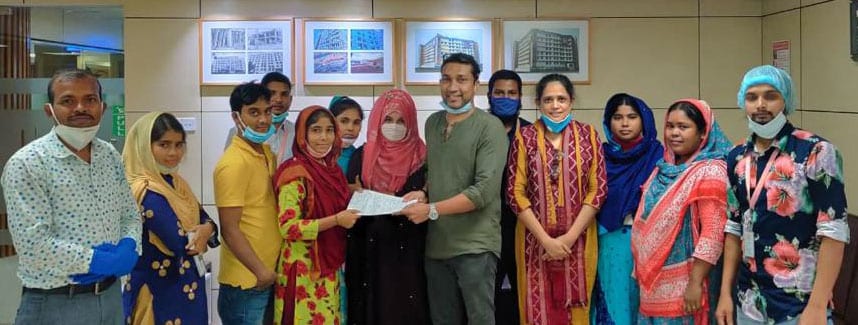
Jun 22, 2020
More than 2,000 garment workers in Bangladesh are celebrating a new collective bargaining agreement that includes a 10 percent pay increase—double the amount required by law—and creation of a committee to prevent violence and harassment on the job. The pact, negotiated by the Hop Lun Apparels Ltd. Sommilito Sramik Union (HLALSSU), is retroactive to January.
The new agreement comes as many garment workers in Bangladesh and around the world are being laid off without pay because major fashion brands are canceling orders due to lack of demand during the novel coronavirus pandemic.
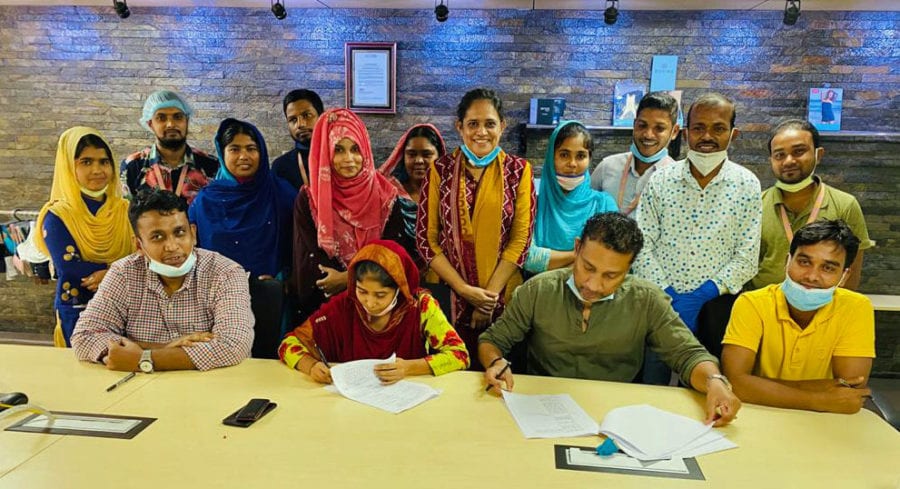
2,000+ Bangladesh garment workers have new contract that includes a 10 percent wage increase and a day care facility for their children. Credit: SGSF
“The guarantee of promotions for women to the higher posts and the establishment of the sexual harassment committee will empower the women and provide safeguards against sexual abuse and harassment in our factory,” says Aklima HLALSSU president.
Under the new contract, Hop Lun will set up a day care facility for workers’ children younger than age six, who will be guaranteed quality care and education. Factory management will provide free ultrasound tests for all pregnant workers, subsided food in the factory canteen, and guarantee a minimum of 20 women workers will be promoted annually.
Under Bangladesh law, women workers are entitled to 16 weeks’ maternity leave, yet employers often do not grant garment workers the required leave. The new contract provides enforcement of the law.
“It is because we have a strong union that we could maintain a good relation with the factory management and sign this collective bargaining agreement,” says Sommilito Garments Sramik Federation (SGSF) General Secretary Nahidul Hasan Nayan. “That is why, during this COVID-19 crisis, Hop Lun factory maintained the highest standard of safety for its workers and has provided each and every employee with proper protective equipment.”
The contract also includes provisions to streamline union representation, with the employer providing space for a union office and automatically deducting union dues. Union leaders will be involved in trainings and workshops and joint meetings with management.
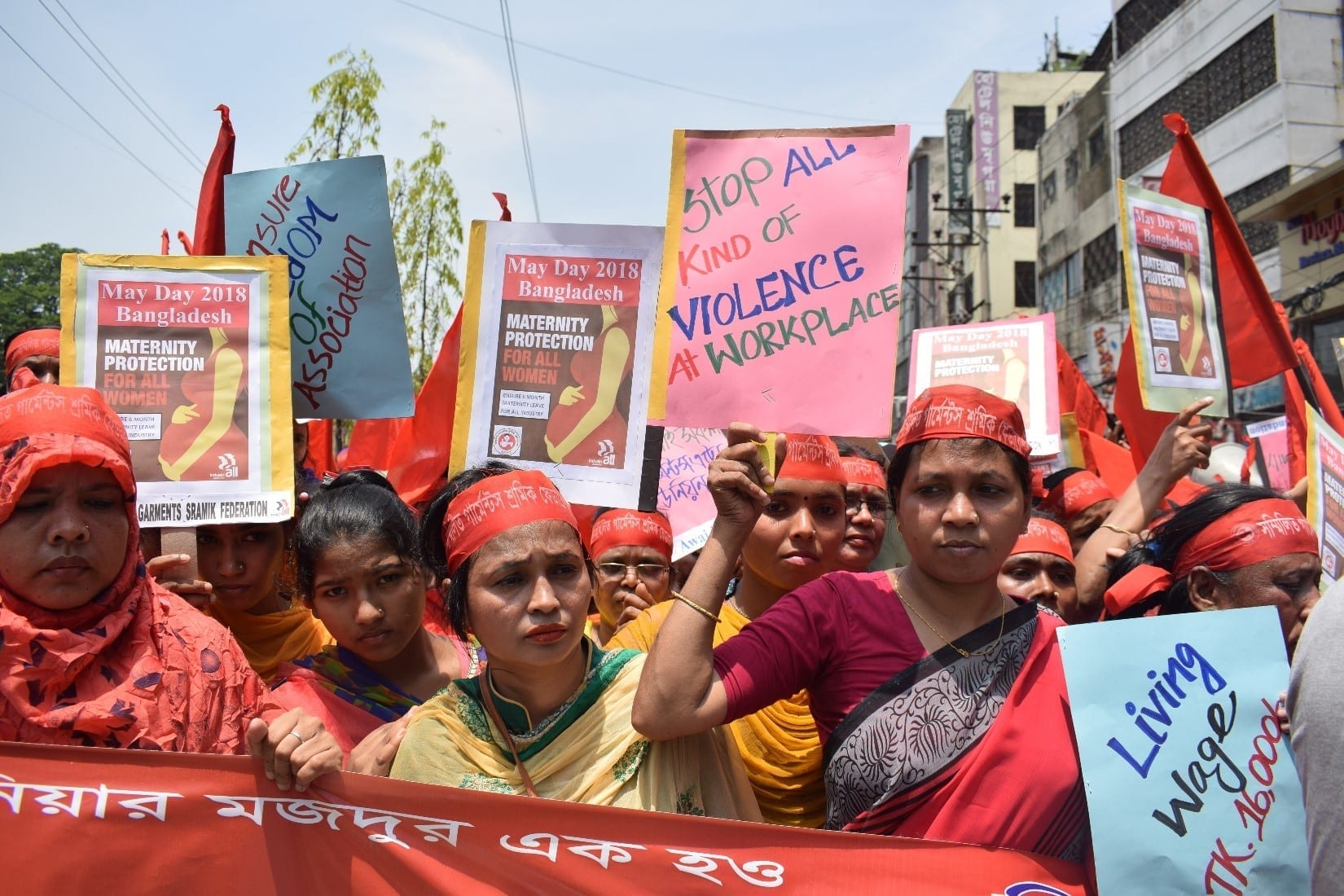
Feb 10, 2020
In Bangladesh, garment workers often seek to form unions and worker associations to better protect against wage theft, unfair treatment and lack of health and safety protections, including large-scale safety threats like building collapses. Yet they increasingly are being denied the ability to do so because of an intensifying anti-worker environment in which their efforts to form unions are suppressed. Even when they succeed in forming unions, their attempts to register them with the government often are denied, according to data compiled by the Solidarity Center.

Golam Azam, a BGIWF organizer, says garment workers encounter government resistance when registering unions. Credit: Solidarity Center/Istiak Inam
Of the 1,031 union registration applications tracked between 2010 to 2018, the government rejected 46 percent—even though registration is meant to be a simple administrative process. Union leaders say the Registrar of Trade Unions (RTU) imposes burdensome conditions and rejects applications for reasons like lack of a union members’ ID or other employer-provided documents (which is not required by law), or because the factory ID number does not match with factory records (even though it is up to management to provide correct ID numbers).
Meanwhile, unions are rarely provided an opportunity to rebut the RTU determination.
Golam Azam, an organizer with the Bangladesh Garment and Industrial Workers’ Federation (BGIWF), has firsthand experience with such rejections.
“We have submitted trade union registration forms for Moon Radiance Ltd., with 2,000 workers in that factory, three times since 2018 and have been rejected each time,” he says. “For FGS Denimware Ltd., we have submitted the forms twice but got rejected. We were going to submit it the third time, but management made their own union right before we submitted the form.”
Unions, Workers Targeted for Standing Up for Their Rights
Bangladesh’s ready-made garment (RMG) sector employs nearly 4 million workers and increased its annual revenue from $19 billion to $34 billion between 2012 and 2019—a 79 percent rise. Yet, workers continue to earn the lowest wages in the region, even after a wage increase at the end of 2018 made the legal monthly minimum wage $95—roughly half of the wage needed to make ends meet in Dhaka, the capital, where the cost of living is equivalent to that of Montreal.
 Outraged that the new minimum wage did not reflect the amount needed to get by, garment workers protested in December 2018 and January 2019. More than 11,000 union leaders and garment workers were fired following the demonstrations, and blacklists bearing workers’ names and faces hung outside factory gates. Dozens of workers were arrested, and some remained in jail on trumped-up charges for more than a month.
Outraged that the new minimum wage did not reflect the amount needed to get by, garment workers protested in December 2018 and January 2019. More than 11,000 union leaders and garment workers were fired following the demonstrations, and blacklists bearing workers’ names and faces hung outside factory gates. Dozens of workers were arrested, and some remained in jail on trumped-up charges for more than a month.
Following the crackdown on workers, fewer garment workers sought to form or register unions. Unions filed only eight registration applications from December 2018 to January 2019 compared with 33 from December 2017 to January 2018, according to Solidarity Center data.
Union supporters experience constant employer harassment and intimidation, including dismissals for union activism, as well as verbal and physical abuse by management.
“Management puts extra workload on the union leaders and in many cases terminates the workers who they think might protest in future,” says Azam. “For instance, in Al Gawsia factory in Ashulia, false cases have been filed against union leaders and members so that they can be terminated and will not get their due benefits. Workers are subject to false cases even when they do nothing against the law, but when the management violates the law, they are not subject to any repercussion.”
‘A Union Has Empowered Me to Demand My Rights’
Following the deaths of more than 1,200 garment workers in the 2012 fire at the Tazreen Fashions factory and the 2013 Rana Plaza building collapse, workers vigorously organized to form unions and negotiate contracts, as the Bangladesh government and RMG employers responded to international pressure to improve safety and wages.
Yet for many workers at the country’s 5,000 garment factories, fire safety and other hazards are still a danger, and employers often arbitrarily fire workers, deny them maternity leave or other legal benefits, and sexually harass women workers or engage in other forms of gender-based violence—making the ability of workers to form unions and worker associations essential.
Mosammat Shorifunnesa, a garment worker and factory union leader, describes how the union made a difference for his co-workers.
“In one instance, five of my workmates were ordered to stay after work and were then fired the same day without prior notice or any payments,” she says. After multiple meetings with management, the factory compensated each worker between $766 and $1,120, as required by Bangladesh Labor Act.
“The trade union is not just an organization, it is a bond between the deprived and the voiceless that enables us to have collective power,” says Shorifunnesa. “It has empowered me to demand my rights and has united my workmates. It gives me the strength to stand by them, and them the courage to stand by me.”
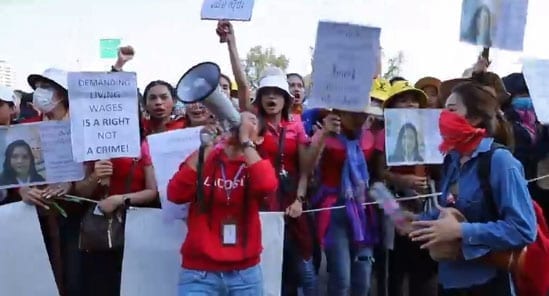
Jan 14, 2020
Thousands of casino workers at NagaWorld hotel and casino complex in Phnom Penh, Cambodia, won a wage increase that boosts pay between 18 percent and 30 percent and secured the reinstatement of union president Sithar Chhim, who was suspended from her job in September for defending the right of a union member to wear a shirt with a message that called for higher wages. The agreement also provides a $200 incentive for workers without health insurance and a bonus equal to roughly two months’ salary, says Chhim.
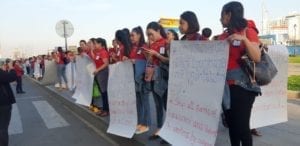
Credit: Solidarity Center
Some 5,000 of the 8,000 workers—including dealers, slot machine workers, housekeepers and technicians—struck the casino January 9, and more than 4,000 rallied outside the complex for two days with signs saying “Demanding living wages is a right, not a crime!” and holding placards with photos of Chhim seeking her reinstatement. Chhim, a game floor supervisor, is branch president for the Khmer Employees’ Labor Rights Support Union of NagaWorld.
NagaCorp, a five-hotel resort and casino, has an exclusive, multidecade license to operate in Phnom Penh and reported an estimated $1.8 billion in revenue last year, up from $1.5 billion in 2018. Yet housekeepers are paid $191 per month.
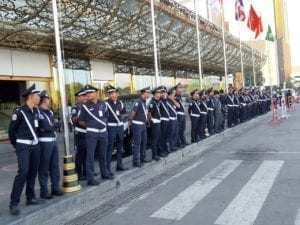
Police at NagaWorld hotel and casino as workers rallied outside. Credit: Solidarity Center
In May, nearly all 4,000 union members signed a petition demanding a wage increase, and the union began negotiations with the employer in June. When the company did not return to the bargaining table after three months as it indicated it would, more than 1,500 union members met September 19 and agreed to wear T-shirts with a message highlighting the company’s profits and expressing workers’ need for a wage that pays their rent, food, transportation and other basic monthly expenses.
The next day, Chhim was detained for hours at the facility and suspended. Union members immediately walked out in support of her. Sithar told Equal Times she then urged her colleagues to continue to work as usual, while organizing subtle protest actions, which included union members wearing pink face masks, black armbands and other markers of solidarity as they enter and exit the tightly guarded checkpoints of the complex.
After the union provided legal notice of the strike, the company continued hiring new workers, providing them accommodation and food in the company’s building and prohibiting them from leaving the facilities or contacting their families, according to the union.
Challenging Environment for Workers
The casino workers’ victory is all the more notable because of the many recent challenges to worker wrights in Cambodia.
Union leaders say amendments to 10 articles in Cambodia’s Law on Trade Unions restrict fundamental union activities. For instance, one amendment deprives unions of their right to hold legal strikes. “[Holding] a legal strike is always difficult, and I think the barriers in the Trade Union Law have actually made it more difficult,” says William Conklin, Solidarity Center Cambodia country director.
Cambodia’s labor rights are currently under intense scrutiny, as the European Union decides whether to rescind the nation’s preferential trade status that grants Cambodian exports duty-free access into EU markets.
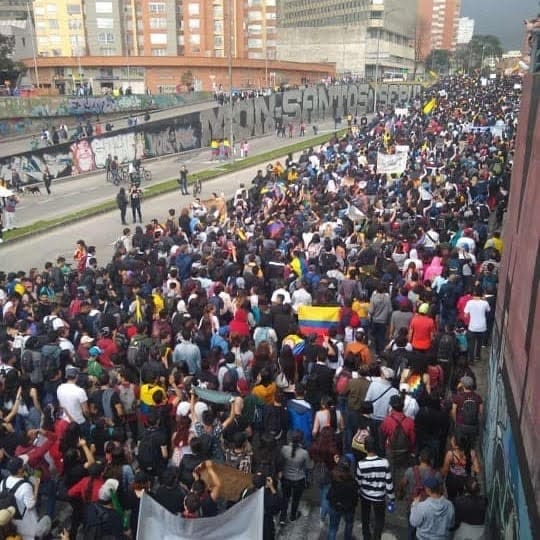
Nov 21, 2019
Tens of thousands of Colombians have taken to the streets across the country today, simmering with anger over the government’s moves to cut wages and pensions, restrict the right to protest, hike energy prices and reward corporations with tax cuts, among other proposed measures. The president responded by closing the borders, raiding the homes of activists and mobilizing riot police.
The nationwide strike, organized and led by unions, students, Afro-Colombians and indigenous Colombians, has tapped into deep discontent with the government of Ivan Duque. “Even the middle class is fed up with domination by the superwealthy and political class,” reported Courthouse News Service. “Colombian human rights defenders, artists, LGBT groups, teachers, health workers, air traffic controllers and others joined the call for a national day of peaceful protest.”
Income inequality in Colombia is high, in both regional and global terms, as are both unemployment and the poverty rate.
Among protester grievances are proposals that would: reduce salaries for young people to 75 percent of the minimum wage; privatize the pension system and base pension payments below the minimum wage; cut taxes for large companies while raising them for the middle class; and increase the cost of electricity by 35 percent, according the Colombian union federation CUT, a longstanding Solidarity Center partner. In addition, they are decrying the government’s inaction on the murders of community leaders and activists and corruption draining the public coffers.
In today’s strike, Colombia joins a host of countries—from Lebanon to Haiti—that have seen mass protests over bread-and-butter issues like wages, jobs and corruption.
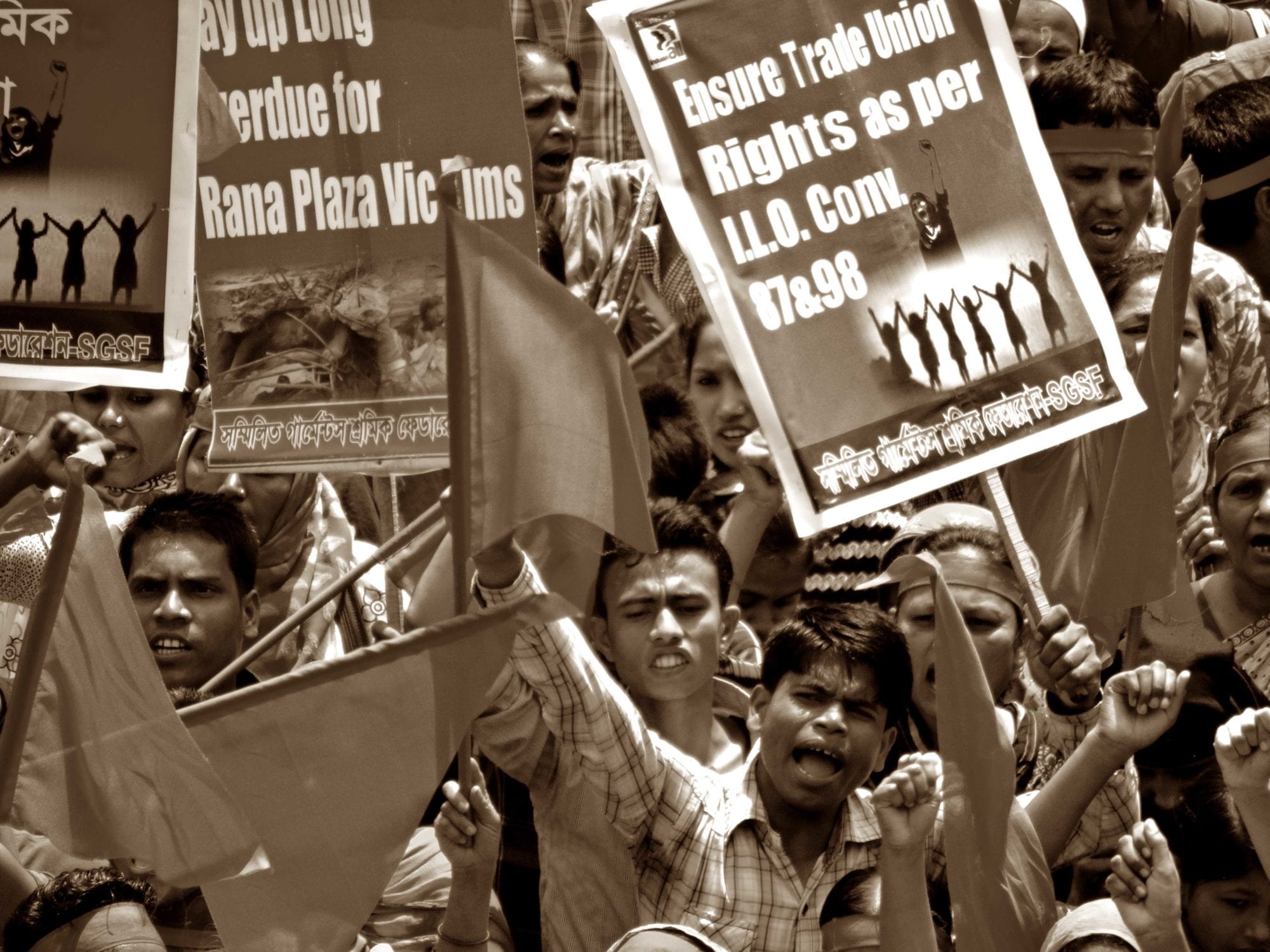
Feb 14, 2019
Tens of thousands of Bangladesh garment workers waged weeks-long strikes in December and January to protest low wages and unequal pay increases—and now workers say factory employers are using the walkouts to further repress their efforts to form unions and collectively bargain better wages and working conditions.
More than 11,000 garment workers have lost their jobs or faced repression as a result of the wage protests, and employers and the police have filed cases against more than 3,000 workers, according to the global union IndustriALL. Many workers fired say they were not involved in the protests.
During the walkouts, police used tear gas, water cannons, batons and rubber bullets, reportedly injuring dozens of workers and killing 22-year-old Sumon Mia, a worker at Anlima Textile in Savar, who was shot dead on his way back to work from lunch.
Billboards with names and photographs of terminated workers have been posted at some factories as an intimidation tactic, and union leaders say factory management is exploiting the walkouts to target and blacklist them from employment in the sector.
Factory walkouts began the second week of December, when mostly nonunion garment workers from roughly 350 factories in Gazipur, Ashulia and Narayanganj protested the elimination of the 5 percent annual wage increase for 2018 and a basic wage increase applied unequally to workers with various skill levels.
Recent Repression of Worker Rights Part of Longer Trend
Following the deaths of more than 1,200 garment workers in the 2012 fire at the Tazreen Fashions factory and the 2013 Rana Plaza building collapse, workers vigorously organized to form unions and negotiate contracts, as the Bangladesh government and ready-made garment (RMG) employers responded to international pressure to improve safety and wages.
But in recent years, employer harassment—including physical attacks and threatening home visits—and government resistance to workers seeking to register unions have meant even fewer workers can join together to collectively improve their workplaces. As recently as November 2018, two union organizers were brutally attacked by men associated with factory management, according to union leaders.
At the same time, Bangladesh’s highest court threatens the expulsion of the Accord on Fire and Building Safety in Bangladesh established after the Rana Plaza disaster. The legally binding agreement between hundreds of primarily European corporate retail brands and unions conducted safety inspections at more than 1,000 factories and educated workers on safety and other workplace rights.
Bangladesh is the biggest producer of garments in the world after China, with apparel exports totaling more than $30 billion last fiscal year. Although the Bangladesh RMG industry is by far the country’s biggest export earner, wages remain the lowest among major garment-manufacturing nations. Yet the cost of living in Dhaka is equivalent to that of Montreal.





 Outraged that the new minimum wage did not reflect the amount needed to get by, garment workers protested in December 2018 and January 2019. More than 11,000 union leaders and garment workers
Outraged that the new minimum wage did not reflect the amount needed to get by, garment workers protested in December 2018 and January 2019. More than 11,000 union leaders and garment workers 



